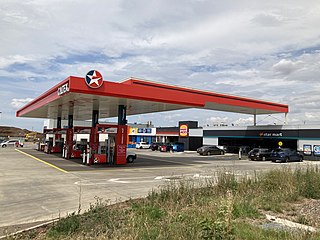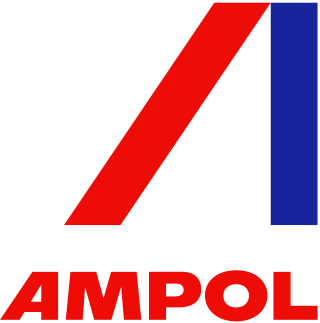
Mobil is a petroleum brand owned and operated by American oil and gas corporation ExxonMobil. The brand was formerly owned and operated by an oil and gas corporation of the same name, which itself merged with Exxon to form ExxonMobil in 1999.

Chevron Corporation is an American multinational energy corporation predominantly specializing in oil and gas. The second-largest direct descendant of Standard Oil, and originally known as the Standard Oil Company of California, it is active in more than 180 countries. Within oil and gas, Chevron is vertically integrated and is involved in hydrocarbon exploration, production, refining, marketing and transport, chemicals manufacturing and sales, and power generation.

Oil sands are a type of unconventional petroleum deposit. They are either loose sands, or partially consolidated sandstone containing a naturally occurring mixture of sand, clay, and water, soaked with bitumen.

Husky Energy Inc. was a Canadian company engaged in hydrocarbon exploration, headquartered in Calgary, Alberta, Canada. It operated in Western and Atlantic Canada, the United States and the Asia Pacific region, with upstream and downstream business segments. In the 2020 Forbes Global 2000, Husky Energy was ranked as the 1443rd-largest public company in the world.
CSR Limited is a major Australian industrial company, producing building products and having a 25% share in the Tomago aluminium smelter located near Newcastle, New South Wales. It is publicly traded on the Australian Securities Exchange. In 2021, it had over 3,000 employees and reported an after-tax profit of $146 million. The company has a diversified shareholding, with predominantly Australian fund managers and retail owners. The group's corporate headquarters is in North Ryde, Sydney.

Suncor Energy Inc. is a Canadian integrated energy company based in Calgary, Alberta. It specializes in production of synthetic crude from oil sands. In the 2020 Forbes Global 2000, Suncor Energy was ranked as the 48th-largest public company in the world.

Caltex is a petroleum brand name of Chevron Corporation used in the Asia-Pacific region, the Middle East, and Southern Africa. Headquartered in Singapore, it is also the brand name of non-Chevron petroleum companies in some countries under a trademark licensing agreement with Chevron.

Boral Limited is an Australian construction materials company manufacturing. It is owned by Seven Group Holdings.

Kochi Refinery Limited (KRL) is a crude oil refinery in the city of Kochi in Kerala, India. It is the largest public sector refinery in India with a production capacity of 15.5 million tonnes per year. Formerly known as Cochin Refineries Limited and later renamed as Kochi Refineries Limited, it was acquired by Bharat Petroleum Corporation Limited in the year 2006. The refinery is situated at Ambalamugal, around 12 km (7.5 mi) east of the city centre.

Shell Australia is the Australian subsidiary of Shell. Shell has operated in Australia since 1901, initially delivering bulk fuel into Australia, then establishing storage and distribution terminals, oil refineries, and a network of service stations. It extended its Australian activities to oil exploration, petrochemicals and coal mining, and became a leading partner in Australia's largest resource development project, the North West Shelf Venture.

Ampol Limited is an Australian petroleum company headquartered in Sydney, New South Wales. Ampol is the largest transport energy distributor and retailer in Australia, with more than 1,900 Ampol-branded service stations across the country as of October 2022. Ampol also operates in New Zealand through its subsidiary Z Energy.
Prax Lindsey Oil Refinery is an oil refinery in North Killingholme, North Lincolnshire, England owned and operated by the Prax Group. It lies to the north of the Humber Refinery, owned by rival oil company Phillips 66, and the railway line to Immingham Docks. Immingham Power Station, owned by VPI Immingham, provides the electricity and heat for the fractionation processes.

Shell Haven was a port on the north bank of the Thames Estuary at the eastern end of Thurrock, Essex, England and then an oil refinery. The refinery closed in 1999 and the site was purchased by DP World who received planning consent in May 2007 for the new London Gateway deep water container port at the site. The neighbouring Coryton Refinery remained in operation until 2012.

Golden Fleece was an Australian brand of petroleum products and service stations operated by Harold Sleigh and Company, a business founded in Melbourne, Australia in 1893 by shipowner and merchant Harold Crofton Sleigh (1867–1933) and manufacturer and shipowner John McIlwraith (1828–1902).

Civil & Civic was an Australian construction company. Founded in 1951, it was acquired in 1961 by Lend Lease Corporation.

Gull Petroleum is a petroleum distributor in Australia. Founded in Perth, Western Australia in 1976, it was later owned by Puma Energy and now owned by Chevron Corporation (Caltex).

Heidelberg Materials is a premixed concrete, aggregates and precast company. Founded in 1949 as Pioneer Concrete and later re-branded to Pioneer International, it was taken over by Hanson in 1999. In 2024 Hanson was renamed to the now current ‘’’Heidelberg Materials’’’.

The Clyde Refinery was a crude oil refinery located in Clyde, New South Wales, Australia, operating between 1925 and 2013. At the time of its closure it had a refinery capacity of 85,000 barrels per day (13,500 m3/d) and was the oldest operating oil refinery in Australia. It was operated by Shell Refining (Australia) Pty Ltd and owned by the Royal Dutch Shell.

Ceylon Petroleum Corporation, commonly known as CEYPETCO (CPC), is a Sri Lankan oil and gas company. Established in 1962 and wholly owned by the Government of Sri Lanka, it is the largest oil company in Sri Lanka. It was formed in 1961 by nationalisation and expropriation of all private oil companies in Sri Lanka at the time of its formation. It is under the ownership of Ministry of Petroleum Resources Development headquartered in Colombo. It is the largest government owned company in the country, with an operational profit of Rs. 33.9 billion for the financial year 2020.

Puma Energy is a Swiss multinational mid- and downstream oil company, majority-owned by Singapore-incorporated Swiss company Trafigura.


















